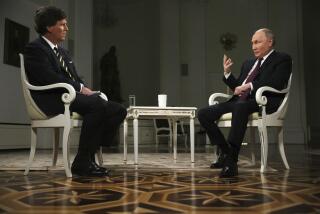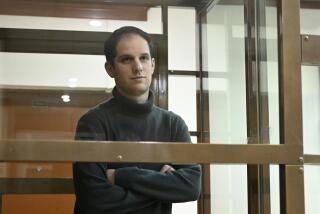Kohl Keeps Silent on Prisoner Remarks
- Share via
BONN — Chancellor Helmut Kohl bluntly refused Friday to clarify a key element of his recent meeting with Soviet President Mikhail S. Gorbachev--the number of political prisoners in the Soviet Union and whether the Kremlin is prepared, as Kohl said last week, to set them free.
Kohl, who appeared at a news conference Friday with visiting President Francois Mitterrand of France, also refused to answer a question about West Germany’s position on a Soviet proposal to have a human rights conference in Moscow in 1991.
And he prevented Mitterrand from answering the same question. When the question was put to Mitterrand, Kohl stepped in and told the reporters that Mitterrand had not yet been to Moscow. Mitterrand is scheduled to meet with Gorbachev in Moscow later this month.
Kohl’s stonewalling performance, after two days of talks with Mitterrand, left up in the air the question of whether Gorbachev had actually promised, as Kohl said in Moscow last week, to release all the political prisoners in the Soviet Union by the end of the year.
U.S. officials as well as others have expressed skepticism about Kohl’s paraphrase of Gorbachev’s intention.
After talking with Gorbachev, Kohl had told reporters in Moscow last week, “The Soviet side expressed its readiness to release by the end of the year all people whom the West considers to be political prisoners.”
But on Thursday, Gennady I. Gerasimov, chief spokesman for the Soviet Foreign Ministry, denied that Gorbachev had made any such statement to Kohl.
According to Western estimates, the Soviet Union is holding at least 250 prisoners because of their political or religious beliefs.
Gerasimov said Thursday that, by Soviet count, only 11 persons are being held under “political” articles of the penal code, and that 25 others are undergoing psychiatric treatment.
He did not specify the offenses for which the psychiatric patients were detained.
The issue has become important in Europe because of the Soviet proposal for a human rights conference in Moscow in 1991 as part of the long-running Conference on Security and Cooperation in Europe in Vienna.
The West German and French governments have agreed to such a conference if Moscow releases its political prisoners, stops jamming all Western radio broadcasts and lifts travel restrictions on its citizens.
But the United States, Britain and Canada have been reluctant to agree to such a conference. They argue that it would be a propaganda show designed to make a mockery of the 1975 Helsinki accords on European security and, among other things, human rights.
A major goal of the conference in Vienna, in which 35 governments are taking part, is to produce a mandate for the countries of the North Atlantic Treaty Organization and the Soviet-led Warsaw Pact to begin serious new talks on reducing conventional weapons.
Some diplomatic observers regard such talks as perhaps more important to security than talks under way in Geneva on reducing strategic nuclear weapons.
Kohl and Mitterrand, in their just-concluded meetings in Bonn, discussed ways of improving relations between Western Europe and the Communist Bloc.
More to Read
Sign up for Essential California
The most important California stories and recommendations in your inbox every morning.
You may occasionally receive promotional content from the Los Angeles Times.













